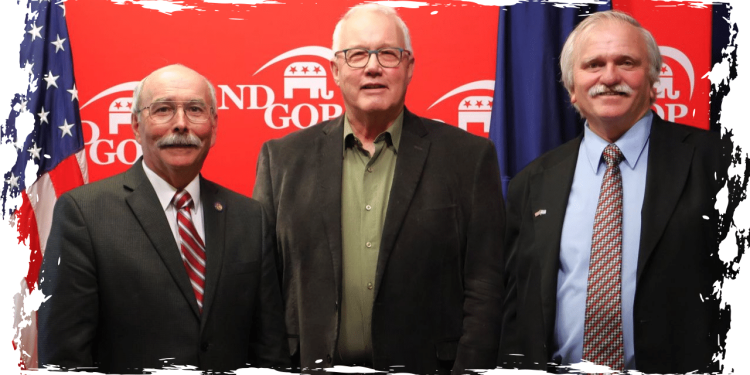Three incumbents from District 14, Sen. Jerry Klein, Rep. Jon O. Nelson, and Rep. Robin Weisz, posed for a group photo announcing their reelection campaigns at NDGOP Headquarters on Feb. 15, 2024. The photo captured the trio smiling, ready to continue serving their district. Michael Achterling from North Dakota Monitor captured the moment in a snapshot.
In Tuesday’s primary election, conservative challengers faced disappointing defeats as incumbent Republicans in the North Dakota Legislature emerged victorious with overwhelming margins.
Despite not receiving endorsements from their local Republican Party district conventions, many incumbents were able to secure wins.
In central North Dakota’s District 14, incumbents showed up at their district convention but chose not to pursue the party’s endorsement.
On Tuesday night, Rep. Jon Nelson, R-Rugby, succeeded in securing his place on the November ballot with 26% of the vote. Nelson expressed feeling like a target during the campaign.
Nelson expressed his gratitude towards the people for their support during the recent elections across the state, not just in District 14. He acknowledged the fact that people did not fall prey to the tactics used to distort and misrepresent their voting records, and he was pleased with the outcome. “It was nice that it turned out as well as it did,” he added.
On Tuesday, challengers were defeated by other District 14 lawmakers, including Sen. Jerry Klein, R-Fessenden, and Rep. Robin Weisz, R-Hurdsfield.
According to Nelson, certain contenders appeared to be more focused on dictating the sentiments and preferences of voters instead of attentively listening to their worries.
Nelson expressed his satisfaction with how things turned out in North Dakota, stating that it was essentially a case of “their way or the highway”, with the former prevailing in almost every instance. “I’m damn glad they did,” he added.
According to Nelson, the traditional method of campaigning, which involves personally knocking on doors, played a significant role in his and his colleagues’ success on election night. He firmly believes in the effectiveness of this old-school approach.
“We put in a lot of hard work,” he stated. “Furthermore, we made a conscious decision not to take a negative approach.”
Larry Danduran, one of Nelson’s challengers, declared that he and his fellow grassroots Republican challengers have no intention of disappearing anytime soon.
According to Danduran, the primary race was a valuable learning opportunity for all three candidates. Despite receiving 21% of the vote on primary night, which was approximately 365 votes less than Nelson’s total, Danduran remains positive. The district saw over 7,600 ballots cast, and other contenders included Karisa Grothe and Jason Steidl.
He raised doubts about the significance of securing the Republican endorsement.
Danduran expressed his views on their endorsement, stating that it may not hold much significance in North Dakota when it comes to the NDGOP. He mentioned that despite being endorsed, they did not receive any support from other sources.
It was highlighted by him that although most of the challengers’ funds were contributed by individuals, the incumbents garnered a significant portion of their donations from political action committees and special interest groups.
Danduran expressed his optimism towards the future of their grassroots movement in the state, stating that they will persistently strive for progress, organize themselves effectively, and be prepared for the next opportunity that arises.
In Bismarck’s District 30, even though they were censured at their party endorsing convention for not attending the event, the incumbent legislators managed to move forward for the November elections. Sen. Diane Larson emerged victorious over Adam Rose in the District 30 Republican primary with 40% of the vote, while Reps. Mike Nathe and Glen Bosch each received 31% of the votes, defeating Justis Amundson and Dave Charles.
Other examples of incumbent wins Tuesday
In District 2, Republican House incumbents Rep. Bert Anderson, R-Crosby, and Rep. Donald Longmuir, R-Stanley, emerged victorious in the recent elections. They both garnered 29% of the votes, beating their challengers Alexa Althoff and Charles Ringwall, who received 26% and 16% of the votes, respectively.
Rep. Paul John Thomas, R-Velva, secured the Senate nomination for an open seat in District 6 with an impressive 64% of the vote, defeating his opponent Zach Lessig. Meanwhile, in the district’s Republican House race, incumbent Rep. Dick Anderson, R-Willow City, and Dan Vollmer emerged victorious, with 29% and 28% of the vote, respectively. They defeated their challengers Pat Bachmeier and Kolette Kramer in a closely contested race.
Rep. Claire Cory, a Republican from Grand Forks, emerged victorious in the race for an open Senate seat in District 42, defeating challenger Dustin McNally with 56% of the vote. The seat was previously held by Sen. Curt Kreun.
In the race for District 42 House, Rep. Emily O’Brien, the incumbent lawmaker from Grand Forks, received 29% of the vote, while her Republican opponent Doug Osowski secured 42% of the vote. The third challenger, Sadie Hanson, received support on 28% of the ballots and lost to O’Brien by a narrow margin of 11 votes.
You can access a comprehensive rundown of primary election results by visiting the website of the Secretary of State.
North Dakota Monitor reports that Incumbent Republican legislators have emerged victorious over their primary challengers in a sweeping win across North Dakota.

